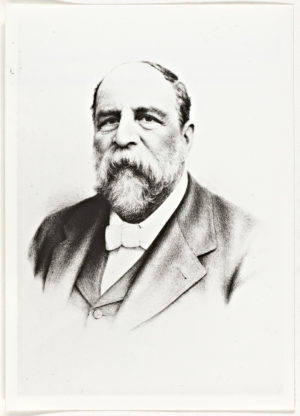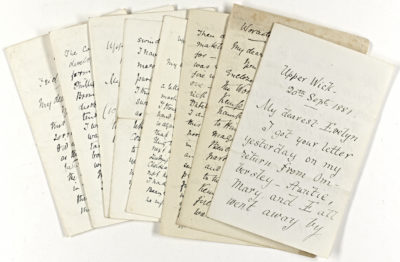Fathers and sons: Letters from George Lynedoch Carmichael to his son Evelyn
- 17th June 2017
| What do you picture when you think of a typical Victorian father? The stereotype is often someone stern, severe and distant. That may have been true of some Victorian fathers, but the reality was often quite different. There were plenty of kind Victorian fathers who were devoted to their children, spent time with them and were fun to be with. |
 George Lynedoch Carmichael (1831-1903)
|
One Victorian father who did not conform to the stereotype was George Lynedoch Carmichael. In 1871 George had just retired from the army following a distinguished military career. He was in the process of taking up the post of Chief Constable of Worcestershire, when he also found himself taking on the role of single parent to his baby son Evelyn. George’s wife Eva had died shortly after childbirth. He never remarried.
George kept up a regular correspondence with Evelyn through his school and university years and during his career as a barrister. In the early letters George confined himself to talking about what he was doing, news about family members and Evelyn’s pets. The letters also reveal George’s attempts to be a supportive parent, such as calming Evelyn’s anxieties during the first days away at school, reassuring him about the necessity of some lengthy dental treatment, praising his successes and commiserating with him when things didn’t go quite so well. Later letters continued to keep Evelyn informed of family, domestic and local news, but were also peppered with references to George’s day-to-day work as Chief Constable and Evelyn’s law work. The comments cast light on the organisation of the Worcestershire police at that time and life on both sides of the law. Sometimes there are some unexpected insights into George’s work such as the headaches involved in planning the security for a royal visit to Madresfield Court in 1898 or being on night duty as part of policing a torchlight procession for Joseph Chamberlain in 1902.

Some of the letters written by George Lynedoch Carmichael to his son Evelyn
George comes across in the letters as a caring and affectionate father. When he died in 1903 several hundred policemen headed the funeral procession and large crowds lined the streets. Local papers reported on the respect and affection in which he was held by so many people.
The George Carmichael letters were acquired by Worcestershire Archive and Archaeology Service with the help of the Friends of Worcestershire Archives.
Photograph of George Lynedoch Carmichael used with permission of West Mercia Police.
See also Bob Pooler’s From Fruit Trees to Furnaces A History of the Worcestershire Constabulary 2002 for details of the Worcestershire Constabulary under George Carmichael.
Post a Comment